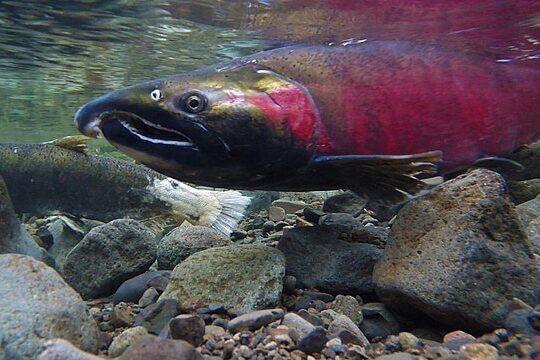
Conservationists are trying to combat a substantial decline in salmon populations by conducting a thorough survey of the River Frome in Dorset.
The Game and Wildlife Conservation Trust’s month-long annual study involved capturing, tagging, and weighing approximately 13,000 fish between Evershot and Poole Harbour.
Pollution and climate change are identified by the charity as significant factors contributing to the decline in both salmon and trout numbers.
Dylan Roberts, the charity’s head of fisheries, said: “If you went back to the 1970s and 80s, about 15-20% of the salmon that went to sea would return as adults – now that figure is about 4-5%.
“We have more intensive farming, lots of problems with sewage in rivers, and that is affecting the quality of the young salmon when they get to sea. They are much smaller – so are less likely to survive.”
Utilising a low-voltage electric field, the team stunned and recorded the salmon and trout on-site before releasing them unharmed into the water.
The gathered data, not only from the River Frome but also from 11 other European rivers, serves as a basis for informing governmental decisions. Additionally, it encourages farmers and water companies to enhance their practices to support fish populations.
A 2022 Environment Agency report underscored that salmon stocks in 74% of rivers in England and Wales were below sustainable levels.
Despite concerted efforts to safeguard fish stocks, challenges such as climate change, marine exploitation, and impediments to fish passage from the sea to spawning grounds continue to impact salmon numbers.
The ongoing survey exemplifies a proactive approach to address these multifaceted threats to freshwater ecosystems.
A spokesperson said: “Coordinated action between governments, partners and industry will be needed to alleviate the combined impact of these pressures and prevent the extinction of this iconic species in our lifetimes.”
——————————————————————————
At Natural World Fund, we are passionate about stopping the decline in our wildlife.
The decline in our wildlife is shocking and frightening. Without much more support, many of the animals we know and love will continue in their decline towards extinction.
When you help to restore a patch of degraded land through rewilding to forests, meadows, or wetlands, you have a massive impact on the biodiversity at a local level. You give animals a home and food that they otherwise would not have had, and it has a positive snowball effect on the food chain.
We are convinced that this is much better for the UK than growing lots of fast-growing coniferous trees, solely to remove carbon, that don’t actually help our animals to thrive.
This is why we stand for restoring nature in the UK through responsible rewilding. For us, it is the right thing to do. Let’s do what’s right for nature!
Donate today at https://naturalworldfund.com/ and join in the solution!

